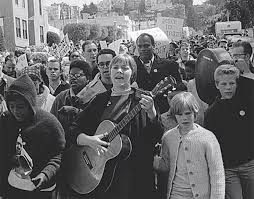 |
| U.S. Jazz, Blues and Protest Folk Singer Barbara Dane in 1970's |
In a 1991 interview, 20th-century and 21st-century U.S. jazz, blues and folk singer Barbara Dane recalled how she organized the first large New York City antiwar movement concert that protested against the Vietnam War, a "Sing-In For Peace," which took place at Carnegie Hall on September 24, 1965:
"...I was in New York and I was living there and I had produced together with [then-Sing-Out magazine editor] Irwin [Silber] something called the `Sing-In For Peace', which was at Carnegie Hall.
"It was the first big, it was actually the first big anti-war demonstration because it was conceived of as a demonstration of singers and their public against the war. And nobody really had mounted a, you know, a big street demonstration or anything.
"So this, we, being the kind of plotters we are, we figured this thing out that.
"And it’s funny. It was right at the time of the newspaper strikes. Lot of newspaper strikes were going on. Two or three papers. I don’t know. It was very hard to get anything in the newspaper. And we had to do it all by quarter-sheets pasted on walls....
"I got some leaflets together and, you know, we got different organizations to leaflet their people and mail it out or whatever we did.
"But anyway, very quickly we saw that, well, sixty some odd performers wanted to be on the thing...I sent a letter to everybody. I coordinated the whole thing out of the Sing-Out magazine office basically (and home) and invited everybody, including a lot of traditional singers…"

U.S. Jazz, Blues and Protest Folk Singer Barbara Dane in 20th-century







